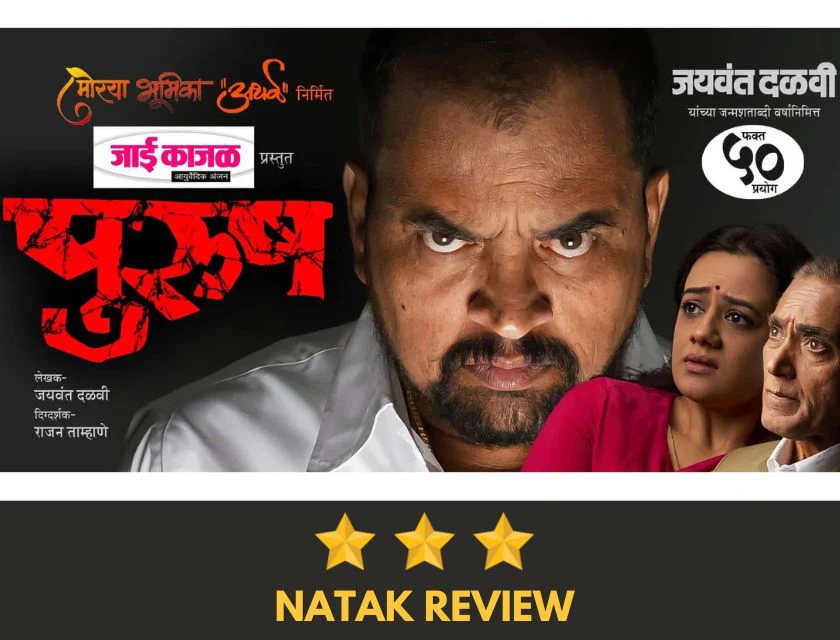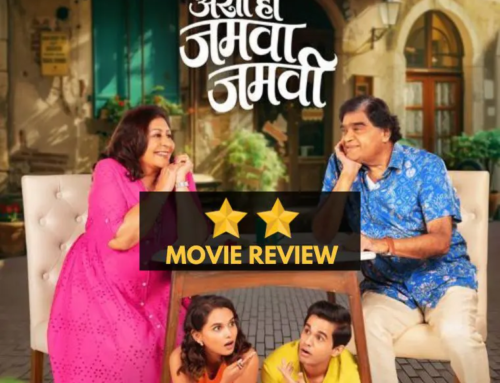Purush Natak Review:
Rating:
Plot:
Ambika is a victim of male attitudes and behaviours. A tragic incident pushes her to plot revenge against a local politician.
Team:
Director:- Rajan Tamhane
Writer:- Jaywant Dalvi
Set Design:- Pradeep Patil
Music:- Vijay Gawande
Lights:- Rajan Tamhane
Cast:- Sharad Ponkshe, Spruha Joshi, Avinash Narkar,
Purush Natak Review:-
Over 1600 shows performed by Nana Patekar and Reema Lagoo 40 years ago made this monumental play a milestone in Jaywant Dalvi’s writing career. Celebrating 100 Years of his birth anniversary, Purush is back with a remake and limited shows. It is directed by Rajan Tamhane and stars Sharad Ponkshe, Spruha Joshi, and Avinash Narkar this time around.
Set in a village and an era when phones were not around, Appa (Avinash Narkar) is a high-profile retired teacher living happily with his family. His wife Tara (Anupama Takmoge) is a housewife, and his daughter Ambika (Spruha Joshi) is a primary teacher who has just started her career. The family is tightly knit and living a simple life. News of a politician raping a girl and then getting out of jail unconvicted makes rounds and at the same time, Gulabrao Jadhav (Sharad Ponkshe) visits Appa’s house.
Gulabrao has an offer to fund Ambika’s school expansion. He promises her to set up meetings with different politicians soon. Things end on a promising note, and he invites her to a meeting soon to be held at his mansion. When she reaches there, the place is empty, and no one seems to be around except for Gulabrao. The dreadful act, the most heinous of crimes a man can do, takes place yet again. Ambika manages to escape the mansion but her spirit does not break. She decides to take things into her own hands and plots an act of revenge against Gulabrao. How far will she go to attain justice is how the play moves forward.
What sets Purush apart is its portrayal of Ambika’s refusal to be a victim. She boldly confronts Deshpande, both emotionally and psychologically, using her intelligence and moral strength to expose his hypocrisy and abuse of power. The title, Purush (which means “man” in Marathi), is deeply ironic. Dalvi uses it to question traditional notions of masculinity. The play contrasts the toxic masculinity embodied by Deshpande with the quiet, supportive masculinity of Ambika’s ally, Pratap, who respects and empowers her autonomy. This duality serves as a critique of societal constructs and offers an alternative perspective on gender roles.
Dalvi’s writing is both sharp and evocative. The dialogues are natural yet layered with subtext, allowing for a deep exploration of the characters’ psyches. Ambika’s confrontations with Deshpande are particularly powerful, brimming with tension and intellectual depth. Dalvi’s use of language not only drives the narrative but also underscores the emotional stakes, making the play a compelling experience. The staging of Purush often employs minimalist settings, focusing instead on the actors’ performances and the intensity of the interactions. This stripped-down approach allows the audience to engage directly with the characters’ struggles and the play’s themes. Symbolism plays a crucial role in the play. Ambika’s resilience and her refusal to capitulate symbolize the larger feminist movement’s fight against systemic patriarchy. The oppressive environment around her reflects the societal constraints women often face, while her triumph serves as a beacon of hope and change. The direction by Rajan Tamhane works as a trigger to fire Jaywant’s heavy writing and is reduced to simply that.
Though the play’s core themes retain their potency, certain aspects of the remake reveal challenges in adapting a classic to contemporary times. One significant critique of the remake is its struggle to fully adapt the original narrative to modern sensibilities. Written in the socio-political context of the late 20th century, Purush reflects issues that, while still relevant, demand a nuanced portrayal for today’s audiences. Contemporary viewers accustomed to more intersectional approaches to gender and power may find the play’s handling of certain issues somewhat dated.
The original play’s pacing worked well for its time, where longer, dialogue-heavy scenes were a norm. However, in the remake, this style sometimes feels overly drawn out. Modern audiences, accustomed to faster narrative flows, may find the exposition-heavy approach testing their patience. While Purush speaks powerfully to issues of patriarchy and corruption, the remake does not fully capitalize on the opportunity to integrate modern feminist perspectives or address evolving discussions about systemic oppression, intersectionality, and gender identities. This makes the remake feel somewhat static in comparison to the rapidly changing social discourse.
Sharad Ponkshe captures Gulabrao’s arrogance, entitlement, and malice with unsettling authenticity. His physicality—whether through his imposing posture, leering expressions, or deliberate pacing—adds to the character’s intimidation factor. The venom in his delivery of lines, especially in his exchanges with Ambika, reveals the depth of his character’s depravity. Ponkshe’s performance shines in his ability to make the audience viscerally dislike Gulabrao, fulfilling his role as a detestable antagonist who epitomizes abuse of power. Spruha Joshi brings a contemporary sensitivity to Ambika, embodying her strength, resilience, and sharp intellect. Her ability to transition between vulnerability and defiance makes her portrayal layered and emotionally impactful. In the intense confrontational scenes with Gulabrao, Joshi commands the stage, delivering monologues with fire and precision that draw audiences into Ambika’s moral struggle.
While the remake of Purush successfully reintroduces Jaywant Dalvi’s thought-provoking themes to a new generation, it occasionally struggles to transcend its roots in a specific historical and cultural moment. The core narrative remains impactful, but the lack of substantial modernization in themes, pacing, and characterization risks alienating contemporary audiences. For anyone interested in exploring meaningful theatre that addresses pressing societal issues, Purush is a must-watch.
Note that the play is only here for 50 shows and a few of them are already up. So, book your tickets ASAP!





